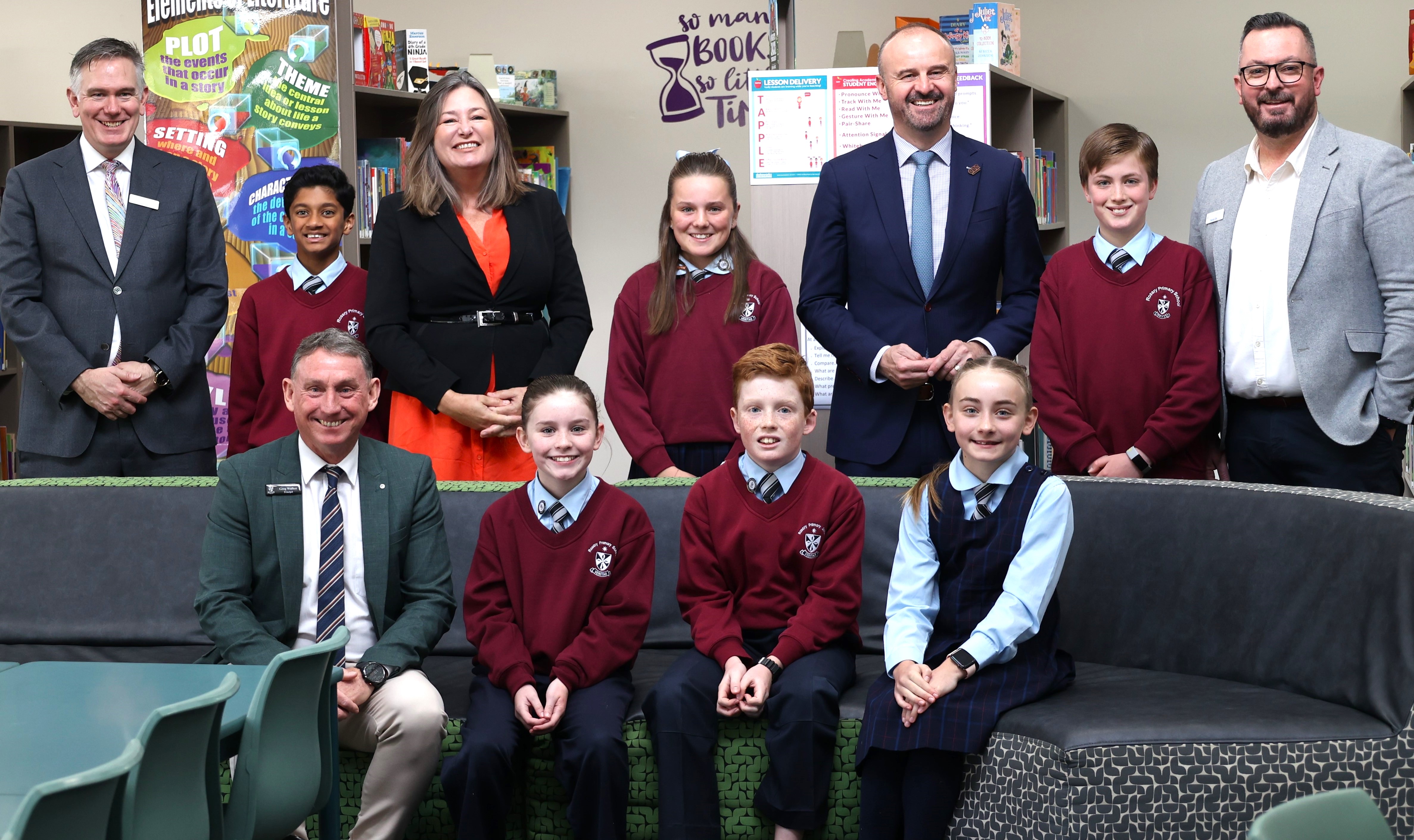Rosary Primary showcases the work of Catholic schools to ACT politicians

CECG Director Ross Fox with ACT Chief Minister Andrew Barr, Deputy Chief Minister Yvette Berry, Rosary Primary School Principal Greg Walker and Year 6 student leaders.
Rosary Primary School was able to showcase its excellence in learning and teaching recently to ACT Chief Minister Andrew Barr and Deputy Chief Minister and Minister for Education Yvette Berry.
Director of Catholic Education Canberra Goulburn Ross Fox talked with Mr Barr and Ms Berry about the inclusive nature of our schools.
‘Historically it has been accepted that Catholic schools are only for Catholics,’ he said. ‘In Canberra, we are proudly Catholic, but we are committed to pluralism and inclusion, welcoming many families of other faiths and none.’
Mr Fox then talked about how CECG schools are leading the way in improving student learning outcomes through high impact teaching practice, including explicit instruction.
‘Delegations from around the country are talking to us about what we’re doing in our classrooms and visiting our schools to see for themselves,’ he said.
With a new literacy and numeracy approach set to be introduced to ACT government schools in 2025, Mr Barr was keen to hear how CECG teachers had engaged in and benefited from the changed approach to learning and teaching.
‘Teachers have learnt so much preparing for these changes to our teaching approach and this has added to their expertise,’ Mr Fox said.
‘We are constantly deepening teachers’ knowledge, developing their understanding of the science of learning and the science of reading, so that they are well placed to transfer the theory into practice.
‘Teachers have told us that the lesson materials we provide in maths and English save them six to ten hours a week,’ he added.
Mr Fox stressed the importance to Mr Barr and Ms Berry of providing training, support and coaching to teachers to build skill and confidence.
Mr Fox explained that Catalyst has shifted the focus from getting through the curriculum content to student mastery. Repetition, recall and retrieval practice helps students to remember and master what they’ve been taught.
‘Parents are saying to us that their children are talking about their learning in a very different way because we’re committed to that repeated exposure through daily review, frequent checking for understanding and whole class engagement.’
Mr Fox stressed that enquiry-based learning and explicit instruction are ‘not at odds.’
‘We believe enquiry should happen after knowledge is gained and securely learnt,’ he explained.
Referring to teacher absences due to illness, Mr Fox added, ‘[Another] major benefit is that relief staff can deliver learning programs with fidelity.’
Mr Fox acknowledged that the implementation of Catalyst had been hard work.
‘We have needed to reprioritise. It’s about what to stop and how we use the resources we already have.
‘Professional learning must prioritise improving learning in the classroom,’ he said.
‘Schools are replacing admin conversations in meetings with learning conversations.’
Reminiscent of Rosary’s early days as a demonstration school for student teachers, the guests toured the school to see high impact teaching in practice in all classrooms.
A visit to kindergarten classes showed students participating in the InitiaLit program, while Year 3 and 4 students engaged in explicit English lessons. The highly competitive Year 5 and 6 classes enthusiastically participated in a spelling mastery lesson.
Year 6 student leaders were proud to show off their school and talked openly with Mr Barr and Ms Berry about how the change to explicit instruction has helped them improve their literacy skills.
